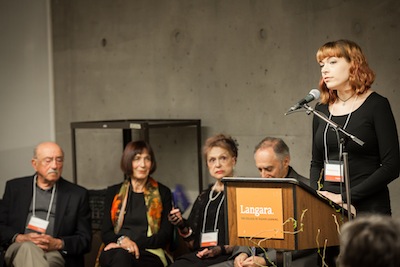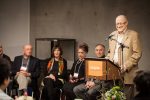Dr. Peter Suedfeld, professor emeritus of psychology at the University of British Columbia, spoke on behalf of the survivors who participated. (photo by Jennifer Oehler)
Emotions were high at a graduation event where survivors of the Holocaust and Langara College students who wrote their memoirs shared their reflections on the experience.
Writing Lives was a two-semester course and a partnership between Langara College, the Vancouver Holocaust Education Centre (VHEC) and the Azrieli Foundation. In the first semester, students learned about the history of European Jewish culture and the Holocaust. In the second term, groups of three students were teamed with a Holocaust survivor. Students interviewed the survivor, transcribed their recollections and wrote their memoirs, which were presented at the closing event April 20.
“These memoirs will be given to the survivors as gifts for themselves and their families, but they will also be archived and they may possibly be published, and they will also serve as legacies for the survivors, their families and perhaps the research community in general,” said Dr. Rachel Mines, an English instructor at Langara and coordinator of the Writing Lives project. “I’m also the daughter of survivors, so I know how important it is that the stories get told and kept as a legacy for the families and the children and the grandchildren and great-grandchildren and also for the community at large, which I think is something that this particular program has succeeded in very well.”
Dr. Peter Suedfeld, professor emeritus of psychology at the University of British Columbia, spoke on behalf of the survivors who participated.
“I have been interviewed a number of times by different people, of different levels of experience. So, when I was asked if I was willing to be interviewed by some students from Langara, I thought, ‘Oh well,’” Suedfeld said to laughter. “It’s not going to be very interesting. They are probably amateurs who don’t really know what they’re doing.”
He was pleasantly surprised, he said.
“My expectations were not fulfilled at all,” he said. “They had fresh points of view, they had interesting ideas about the Holocaust, they had interesting questions – not the kind of routine things that I’ve gone through before with more professional interviewers who tend to ask the same questions the same ways. Some of the questions made me think about my own experiences in ways that I never had before…. The interviews were always interesting and lively, occasionally funny, sometimes a bit frustrating and rarely, but once in awhile, irritating. But, all in all, a very positive experience and I expect that most of my cohort probably had similar experiences, and I certainly hope that the students did as well.”
Frieda Krickan, speaking on behalf of the students in the program, saw Writing Lives as an opportunity to honour the survivors, deepen her knowledge of Holocaust history and serve her Jewish community.
“This class has been so much more than that in so many ways,” she said. “It’s been a life-changing experience and I feel incredibly lucky to be a part of it. This class has taught me the importance of personal perspectives and historical documentation. Memoirs put a more human face on history and they memorialize what our survivors have been through and create empathy that historical facts and figures just cannot…. These survivors represent living history. These memoirs are a way of honouring survivors and making sure that history will never forget them…. You cannot get that sort of visceral emotion and intense human connection from a book or documentary. This is a living, breathing human being in front of you opening up about their most intimate and painful memories. It is an experience I will never forget.”

She added: “I came out of this class with something I did not expect: hope. Amidst all their personal accounts of suffering and loss, our survivors still managed to impart upon us the importance of hope. I don’t know if I’ve ever had such a life-affirming experience as talking to these survivors.”
Gene Homel, an instructor in liberal studies at the B.C. Institute of Technology who taught part of the Writing Lives course, said evidence-based and factual history are important at a time when the veracity of events past and present are being called into question.
The collection and preservation of eyewitness accounts is what makes the Writing Lives project so valuable, said Ilona Shulman Spaar, education director at the VHEC.
“Some students told me that they would never forget the personal encounters that they had with their interviewees and that they will always carry them close to their hearts. Some even mentioned that this program was life-changing for them,” she said. “Some of the survivors shared with me that they greatly appreciated being part of this program. For them, too, it was a unique experience, as most of them never gave interviews to this extent or in such depth.”
Robbie Waisman, one of the survivor participants, said the greatest fear that Holocaust survivors have is what’s going to happen after they are gone.
“What you are doing gives us hope that it’s going to be remembered, to make this a better world,” he said. “So thank you.”
Serge Vanry, another survivor participant, said it was an experience that he hadn’t expected.
“I started out wanting to do this, but feeling uneasy about somehow getting involved in the past, a past that has been put away quite a bit,” he told the audience. “I was talking about events that I had forgotten, things that were difficult, things that were hard to live with and things that can haunt you. As I was looking back at the past, I started to discover a lot of things that I had forgotten – events, situations that really had disappeared for me.”
Turning to the students, he said: “You did extremely well and I am really thankful and I’ve really appreciated what you’ve done for me, for the things that I don’t want to forget, the things that need to be told again for me and for my family.”
Other survivors who participated in Writing Lives were Alex Buckman, Amalia Boe-Fishman, Jannushka Jakobouvitch and Mark Elster. Excerpts from student-participants’ journals have run in previous issues of the Independent (search “Writing Lives” at jewishindependent.ca).
Mines thanked the Azrieli Foundation, for expertise and materials that made Writing Lives possible, and the VHEC, “which has been crucial, essential, absolutely indispensable in supporting Writing Lives … through liaising with survivors, making their library available for research and as an interview room and, generally, just being generous in terms of their time, their advice, expertise and not to mention moral support.”
Mines added that she hoped this pilot project of Writing Lives would become an ongoing program and, in the days following the closing ceremony, she received the news that Writing Lives will indeed run again, starting in the fall semester.
Pat Johnson is a communications and development consultant to the Vancouver Holocaust Education Centre.

